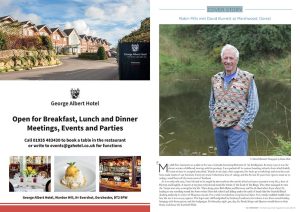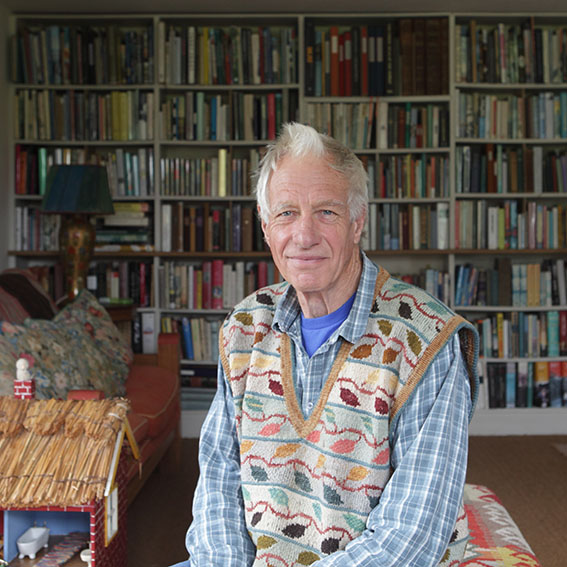
My dad flew Lancasters as a pilot in the war, eventually becoming Director of Air Intelligence. In many ways it was the classic services childhood, moving with his postings. I was packed off to various boarding schools, from which luckily I seem to have to escaped unscathed. Thanks to my dad, a fine carpenter, I’ve built up a workshop, and over the years have made much of our furniture. From my mum I inherited a love of sailing, and for the last 25 years have spent a week or so sailing a small boat off the west coast of Scotland.

As is so often the case, I was blessed to be taught by two teachers who awoke what has been a constant in my life, a love of History and English. A master at my prep school read aloud the whole of the Lord of the Rings. The other managed to turn the Trojan wars into a metaphor for life. Then along came Bob Dylan and Kerouac and On the Road when I was about 16, leading to my travelling round the States when I first left school and falling under the spell of bands like the Grateful Dead (leading indirectly to a love of Bluegrass music). For a while I worked on a hop farm in Kent. For a molly-coddled middle-class boy like me it was an eye-opener. The hops were still handpicked by Cockney Londoners for whom it was their annual holiday, bringing with them granny and the budgerigar. On Saturday night, pay day, the Pearly Kings and Queens would dress in their finery and dance the Lambeth Walk.
I still had no idea what I wanted to do, so drifted into law without giving it much thought. Suddenly I found myself articled to Knocker and Foskett in the Inner Temple, a name only Dickens could have invented. Even in 1964, the firm was a legal dinosaur. At 12 o’clock the whole place came to a halt for ‘partner’s sherry’. It soon became obvious that I was wasting my time and moved on.
A few years later Sarah and I met at a supper in London. She was gorgeous, and I was swept off my feet. Happily, we’re still together 53 years later. Within six weeks we’d swopped her Morris 1000 Traveller for a Landrover, and set out for India. It was 1971, we were 25. We took nearly a year getting there and back on a shoestring budget. It was the Hippie route across Asia, but we spent three months in a hut on a Turkish beach, and drove across the centre of Afghanistan, spending weeks literally in the middle of nowhere. It was a watershed experience for us both, putting our previous lives behind us and embarking on another.
Once back in England, we realised we couldn’t stay a day longer in London. We spent a weekend with some friends near Wimborne, and basically never left, moving into a rented cottage. I think we paid £5 a week. For a while it was hand to mouth. We tried to be self-sufficient, keeping chickens and sheep and growing vegetables. Even now, growing our own food is important to me. Sarah did milk sampling, I did some editing, and finally in 1972 we started a quarterly publication called the Wessex Magazine, an early environmental magazine covering Wiltshire, Somerset and Dorset, which two years later became a casualty of the three-day-week and a collapse in advertising revenue.
By fortuitous chance, while working on the magazine, I went to the Dorset County Museum looking for an old photograph to illustrate an article. Roger Peers, then the curator, showed me a trunk, full of old Dorset photographs. I was captivated. Here was a portrait of a rural way of life that had ended with the First World War. I knew instantly they would make a book. I went to see a London publisher, who said what a good idea and offered me a ridiculous royalty, I think 1.25%. Driving back to Dorset I decided to go ahead and publish it myself. Roger’s support opened doors across Dorset. The result was A Dorset Camera, 1855—1914, which came out exactly 50 years ago and marked the founding of the Dovecote Press.
I took all the orders and did all the deliveries, going from bookshop to bookshop, testing the springs of yet another Morris 1000 Traveller. The first shop I went to took 5 copies. But by the time I’d been round the rest of Dorset they’d rung to order another 10. I went on BBC South Today. By Christmas we’d sold all 2,500 copies, going on to reprint it again and again. I put together a second volume, A Dorset Camera 1914—1945, and the same for Wiltshire. So suddenly I was author, publisher, sales rep, publicist—all from a tiny garden shed which Sarah eventually accidentally set fire to.
By now we had two small children. Money was always tight. In the midst of all this I wrote the first of two historical novels. It was given a good review in the Guardian. Alan Lee, the manager of Natwest in Wimborne, read the review, rang up and said if we ever needed to change banks he thought he might be able to help. A bank manager reading the Guardian! We were through the door the next day. Thanks to Alan, who said ‘yes’ when others were saying ‘no’, we were able to buy our cottage and expand the Dovecote Press. Alan’s in his 90s now and living in Cerne Abbas. We put on a special lunch for him last year as a way of saying thank you.
Gradually I started publishing books by other authors. There was never any masterplan. Things just sort of evolved in an ad hoc way. I was the fortunate beneficiary of advances in printing and typesetting. There were no computers. Invoices were typed, all the sales recorded in pen and ink in enormous ledgers. There was still a network of small country bookshops in every town. Everyone had a bit more leisure time. They wanted to visit gardens or Hardy’s birthplace, learn about Dorset, walk the coast. As the list grew I tried to commission books that appealed to this growing readership for local and natural history.
By now Sarah had started the Natural Dye Company, using natural dyes to dye wool for hand-knitted jerseys to her designs. Her business was an overnight success, before long she had 100 handknitters. With two sources of income, I was able to convert a barn into a warehouse and office. One morning the post brought a letter from John Fowles agreeing to publish a little book on Lyme Regis. He was at the height of his fame: The French Lieutenant’s Woman was being filmed in Lyme. I then published David Cecil’s book on Dorset country houses. Both sold in all the London bookshops and were reviewed in the national press.
Then came another piece of random good fortune, Jack Hargreaves’ Out of Town. AA Gill described Jack as “made for television out of old baler twine and sheep’s fur”. Despite being endlessly asked to write his autobiography, Jack had no time for fancy London publishers. I hadn’t realised quite how famous he was until we met for lunch in a pub in the New Forest and the whole place fell silent. Out of Town has been in print for over 30 years and we’ve sold nearly 100,000 copies.
About a dozen years ago I helped my daughter and son-in-law set up Little Toller Books, based here in Beaminster. Our son is involved in renewable energy and he and his family live over the hill in Membury. Over the last half century, the Dovecote Press has published about 340 different titles, a good half about Dorset. I’ve mentioned only a handful: there are nearly 30 ‘Discover Dorset’ titles alone. The late Queen wrote the Foreword to one book (on the Bath & West Show), Prince Philip another (St George’s Chapel, Windsor), the present King a third (‘Capability’ Brown). One or two were complete disasters. Many of the authors have become friends. In the last few years, we’ve published books on Purbeck stone, Mary Anning, Swanage, and Reynolds Stone, as well as my own two volumes of Lost Dorset. To earn a living from something you love is nothing but a joy and privilege. After half a century near Wimborne we moved two years ago to be near our children and grandchildren. From our house under Lambert’s Castle we look out over the Marshwood Vale. No one could ask for more.




